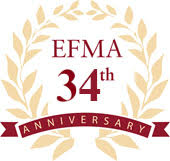Call for Papers
EUROPEAN FINANCIAL MANAGEMENT

1.Call for Papers ESG Evolution: Navigating Future Challenges and Opportunities
About : ESG assets are projected to reach $50 trillion by 2025, constituting over a third of the estimated $140.5 trillion in total global assets under management (Bloomberg). The literature on ESG is evolving rapidly, see for instance, Fama (2021); Alex Edman (2022); Cornell. (2021); Cornell & Shapiro (2021) and Cumming et al (2024) among others. Alex Edman (2022) argues that ESG holds significant importance yet is not uniquely exceptional. He states that companies should not be praised solely for enhancing their ESG performance, neglecting other intangible assets that generate long-term financial and social returns. Prior studies also find that although ESG investing may have positive societal impacts, it does not necessarily lead to higher returns for investors; However, as the polarisation regarding ESG grows, stakeholders with differing and sometimes conflicting ideologies and interests engage in debates over its relevance and impact (Forbs, 2023. Larcker et al (2022) discuss seven commonly accepted myths surrounding ESG, revealing that many lack empirical evidence. Alex Edman (2024) proposed a significant shift in the practice of ESG to the informed creation of long-term value, namely Rational Sustainability. This call for papers encourages research to not only study companies’ commitment to ESG principles e.g., voluntary disclosure during crisis period and whether companies may prioritize financial performance over ESG considerations (value vs values) during times of economic instability but also the future development, challenges of ESG.
Publication opportunity: A special issue of the EFM will be published on “ESG in the Era of Geopolitical and Economic Instability”. Guest Editors are Douglas Cumming (Florida Atlantic University, USA), Hisham Farag (University of Birmingham, UK); Sofia Johan (Florida Atlantic University, USA). The Special Issue will consist of selected papers presented at the conference. Authors are invited to submit research papers electronically via the EFMA website indicating if your paper should be considered for the EFM Special Issue on ESG in the Era of Geopolitical and Economic Instability. Papers will be reviewed following normal EFM standards. After the conference, authors should thoroughly address discussant comments before submitting their papers to the EFM platform. Authors should inform Prof. John Doukas, Editor-in-Chief, European Financial Management, via email (jdoukas@odu.edu) that their submission is intended for the "ESG Evolution: Navigating Future Challenges andOpportunities" special issue.
Paper Submission Procedure:
Papers are to be submitted to: Sustainable Financial Innovation Research Centre-SFIC Email: sficefmconference@contacts.bham.ac.uk with the subject heading: "Dubai Conference on “ESG in the Era of Geopolitical and Economic Instability” In your submissions, please indicate whether you want your paper to be considered for the European Financial Management (EFM).
Key dates: To aid in the development of papers, a two-day conference will be held at Birmingham Business School, University of Birmingham, Dubai, United Arab Emirates on November 25- 26, 2023. The conference will feature an evening reception on 29 November. Conference paper presentations will be on November 30 and December 1 st at the newly constructed Birmingham Dubai campus. Deadline for submission to the conference is June 30 th , 2024. Authors will be notified about acceptance to conference by July 15 th , 2024. Acceptance to the conference does not guarantee acceptance into the European Financial Management.
2.Call for Papers European Financial Management (EFM) Special Issue on “Finance and Business Analytics”
Objective Business analytics can be defined as the set of technologies for solving business problems using quantitative and statistical tools. This involves methods for organizing, transforming, and handling business data in a way that guides decision making and corporate governance. The advent of new technologies, the increase in computational power and the availability of big data, have led businesses analytics to become an indispensable tool for managers and practitioners in finance.
The aim of this Special Issue is to gather and present the latest developments in business analytics and their contribution to finance problems. Suitable topics include innovative applications in the intersection of business analytics and finance and/or the development of new business analytics methodologies designed for finance problems. Papers that develop new approaches in machine learning or econometrics focusing on forecasting, casual inference, asset pricing, financial risk management and corporate decision making are particularly invited. Papers that study the interaction of climate risk, sustainable investments and insurance markets with business analytics are also welcome.
Publication opportunity: All submitted papers will follow the standard blind review process of European Financial Management. The acceptance letters will be issued and sent to the authors by the EFM office.
Participants of the Finance and Business Analytics (FBA) Conference, Athens, Greece 12-14 June 2024 and Thessaloniki, Greece 11-13 June 2025 are particularly encouraged to submit to the Special Issue.
Note to the authors:
Authors are invited to submit two (2) files in PDF format: (1) the complete paper and (2) an anonymous version of it via the EFMA website (https://efmaefm.org/0EFMJOURNAL/submissions/submissions.php) indicating with a brief note that their paper should be considered for the EFM Special Issue on “Finance and Business Analytics”. All submitted papers must include an abstract of 100 words explaining the contribution of the paper.
Key dates: The deadline for initial submissions to the Special Issue is 31 December 2025.
3.Call for Papers European Financial Management (EFM) Special Issue on “Financial Data Science in the Era of Generative AI”
Objective: A new era is emerging where Generative Artificial Intelligence (Generative AI) will play an ever-increasing role in many sectors, including business and finance. For example, in the past, it is challenging to extract sentiment values from textual information, such as news, reports, and social media. Now, with a Large Language Model (LLM) like ChatGPT, it is fast and easy to conduct textual analysis, which can be used for quantitative trading. Financial Data Science analyzes large amounts of data to extract meaningful insights. In doing so, it leverages emerging technologies, such as big data, cloud computing, artificial intelligence, machine learning, etc. Generative AI is a disruptive innovation in artificial intelligence. It has many applications in the finance field. For instance, ChatGPT can be used for sentiment analysis, corporate culture analysis, Federal Reserve opinion analysis, etc.
Generative AI presents opportunities and challenges for financial research. On the one hand, it lowers the technical barriers to apply LLM in finance. On the other hand, researchers raise concerns about its misuses. As such, this special issue calls for papers on Financial Data Science in the Era of Generative AI. It welcomes research articles that present novel theory, algorithms, systems, and applications of Data Science and Generative AI in financial sectors, and encourages submissions from multiple disciplines, including statistics, finance, information systems, computer science, artificial intelligence, etc. Topics of interest include, but are not limited to, data science in finance, generative AI in finance, deep learning in finance, algorithmic trading, robo-advisors, cryptocurrency, initial coin offering, computational finance, financial forecasting, financial network, hedging strategies, etc.
Publication opportunity: All submitted papers will follow the standard blind review process of European Financial Management. The acceptance letters will be issued and sent to the authors by the EFM office.
Paper Submission Procedure : Authors are invited to submit two (2) files in PDF format: (1) the complete paper and (2) an anonymous version of it via the EFMA website (https://efmaefm.org/0EFMJOURNAL/submissions/submissions.php) indicating with a brief note that their paper should be considered for the EFM Special Issue on “Financial Data Science in the Era of Generative AI”. All submitted papers must include an abstract of 100 words explaining the contribution of the paper.
Note : Participants of 2025 European Financial Management Association Annual Meetings are particularly encouraged to submit to the Special Issue.
Key dates: The deadline for initialsubmissionsto the Special Issue is 31 August 2025.
4.Call for Papers European Financial Management (EFM) Special Issue on “Banking in the Era of Climate Risk and Sustainability”
Objective: In the current global financial landscape, the need to align banking practices with sustainability and climate resilience is paramount. As the world confronts the mounting challenge of climate change, the banking sector stands at a critical juncture, charged with incorporating environmental, social, and governance (ESG) considerations into its fundamental operations. This call for papers aims to delve into the complex aspects of banking within the context of climate risk and sustainability. Particularly, it aims to illuminate the ways in which CSR and ESG performance are redefining credit access, impacting credit risk, and revolutionizing overall banking practices.
We aim to explore how CSR performance might bolster access to capital by examining the dynamics that link CSR to financial accessibility, including the influence of CSR strategies on a firm's financing capabilities and the effect of climate change regulations on credit distribution to environmentally impactful firms. Additionally, the issue will investigate the implications of a firm's engagement in CSR activities on the cost of its bank debt, how ESG policies may alter lending dynamics, and the impact of news or events related to a firm’s reputation on its banking relationships. Further, we will analyze the role of ESG factors in evaluating a firm's creditworthiness, including the influence of ESG performance on default risk, the relationship between ESG performance and credit ratings, and their implications for loan spreads. Lastly, we will assess the effect of climate regulation policies on bank loan strategies, exploring how banks might differentiate between polluting and non-polluting firms and the impact of physical and transition risks on banks' risk management strategies. Through these investigations, this special issue aims to provide comprehensive insights and actionable knowledge for scholars, policymakers, and practitioners in the field.
Publication opportunity: All submitted papers will follow the standard blind review process of European Financial Management. The acceptance letters will be issued and sent to the authors by the EFM office.
Paper Submission Procedure : Authors are invited to submit two (2) files in PDF format: (1) the complete paper and (2) an anonymousversion of it via the EFMA website (https://efmaefm.org/0EFMJOURNAL/submissions/submissions.php) indicating with a brief note that their paper should be considered for the EFM Special Issue on “Banking in the Era of Climate Risk and Sustainability”. All submitted papers must include an abstract of 100 words explaining the contribution of the paper.
Note : Participants of the 5th Edition of Financial Economic Meeting (FEM-2024)Paris, 16-18th December 2024 (France) are particularly encouraged to submit to the Special Issue. FEM-2024 website : https://fem2024.sciencesconf.org
Key dates: Key dates. The deadline for initialsubmissionsto the Special Issue is 30 June 2025.



